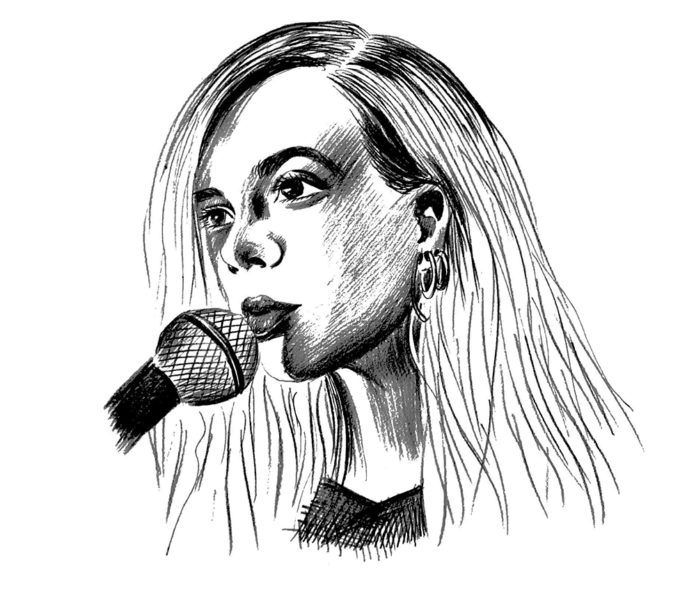When 17-year-old Violet Valenski looks straight into the camera and says, “I don’t believe in love, love’s not real,” I sink into my seat. Unfortunately, this is the first and only time Max Minghella’s new film “Teen Spirit” puts forth a genuine principle. For a directorial debut hell-bent on tapping into the rags-to-riches fantasy of pop music escapism, this relentless angst rigs its thesis from the start. If a bubblegum pop singer doesn’t believe in any kind of love, then what are they doing with a microphone in their hand? What have they been listening to all this time? Violet’s declaration is framed within an interview for a nationally-broadcasted vocal competition. The winner is determined by the votes of British viewers, and this episode introduces the contestants. Millions of fans hold the key to her advancement in a sink or swim process. The protagonist seduces her audience with nihilism, and it works. She’s directly addressing viewers of the film to create a doubling effect of chic detachment. Somehow, we are supposed to believe she’s made a connection. Instead of asking, “Well, then what do you believe in?” the interviewer just stands there like a smiling stiff. Minghella doesn’t challenge Violet’s apathy: he accepts it and forces it on the audience. The sequence is scary and telling because its director and his protagonist assume the confession is relatable.
Similar to Nirvana’s 1991 single, the film uses “teen spirit” as a slogan, not an argument. It shamelessly relaxes into cliches. Violet is played by Elle Fanning and the task of her performance is portraying a blank slate for the viewer’s expectations. She is shy, but the foundations of her distance just don’t add up. There are few angles connecting her to other characters. Her relationships are founded on faintly dotted lines of impersonal dialogue. Minghella wants us to believe she lives on a farm and doesn’t own a cellphone, but she also attends an upscale private school where every other student is rich. In every social situation, Violet is the obvious outcast. When she auditions for the competition, we see shots of wide-eyed robots peppering their faces with makeup while her unimpressed reflection says, “They are not me. I’m different.” It is one thing to establish distinctions, but it is another to use banalities as a crutch. Surely there was a way for the director to inject meaning and personality into Violet’s character without affirming her contempt for effort as deserving.
Successful pop musicians must be aware of the grand gesture. A beating heart is intensified by the romantic explosion in Madonna’s “Like a Prayer,” Mariah Carey’s “All My Life” and Ariana Grande’s “Baby I.” These records sound as if their singers’ beliefs and feelings are aligned in a burst of energy. Violet barely even stumbles into romance. This isn’t in service of her independent agency, because many of her solo scenes are music video montages of napping in the grass and petting a horse. They are missed chances to impose meaning. Vlad, her informal manager and elderly companion, is the only character who receives her emotion. He is a frizzy-haired opera singer you can smell through the screen. However, comic relief is no substitute for self-discovery, and romance leads a character toward maturation. Violet wants to win the competition but Minghella doesn’t probe her engagement with the world.
Last year, Brady Corbett’s film “Vox Lux” told the story of the American public taking on the pain of a survivor’s tragedy and making it their own, superficially, through a viral little vigil song. It dramatized the packaging of pop music and its tensions with an individual artist. The after-effects of a hit record rippled through Celeste and transformed her temperament. “Vox Lux” has the vision and intellect to overcome the stereotypes in singing Cinderella stories because it examined industry success as a vehicle, not just a finish line. “Teen Spirit” tinkers with its model but strips it of personal perspective and honest analysis. Its story takes place in Britain as opposed to America, but this is no excuse not to heighten the stakes and match Corbett’s level. Celeste justified her self-indulgence because it fueled her to remain a symbol of hope and importance. These private desires required her to meet the public where they are in order to exchange ego boots. Violet lacks depth because she isn’t given private desires to begin with, let alone the conviction to act them out.
Her final song, “Don’t Kill My Vibe,” is stunningly impersonal, yet it wins. She performs with a bit of flair, but who is it toward? What is she singing for? These questions are the result of plotlines left unresolved. Vlad’s mysterious past is never revealed and his present-day struggles are unexplained. Violet exchanges a few sentences with a boy from school, but their relationship fizzles out before it even begins. She kisses the reigning winner of the competition but after this scene, they don’t exchange a word of dialogue. Minghella’s meta-commentary doesn’t pierce through a paper bag. “Teen Spirit” shows that when you take the belief out of a pop singer, they’re reduced to a stock.
![]()




































